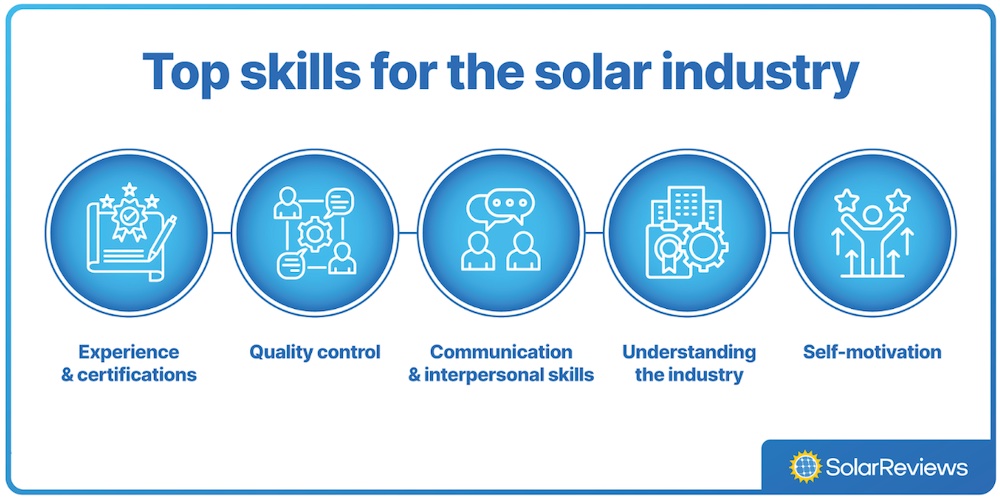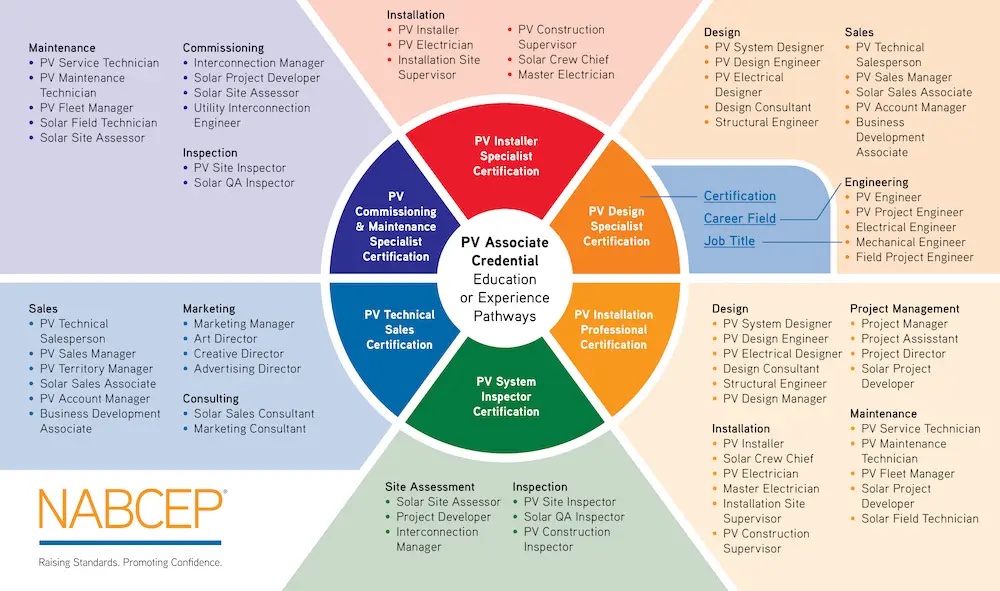Updated 11 months ago
The Complete Guide to Jobs in the Solar Industry
Written by
Jamie Smith

There are endless opportunities to work in the solar industry, from installers to engineers to manufacturers. According to the 2022 Solar Job Census, nearly 264,000 jobs in the United States were dedicated primarily to solar. This was a 3.5% growth since 2021. As solar continues to expand, numerous job openings in the industry might be right for you.
Depending on what sector of the solar industry you’re interested in, you might need different skills, training, or certifications.
Ready to get your career started? Keep reading this comprehensive guide to learn more about solar jobs.
What types of jobs can you work in the solar industry?
There are multiple sectors you can work in pertaining to solar – all of which require different skill sets or levels of education. We’ve listed a few areas of expertise to give you a good idea of what you’ll get into.
Solar photovoltaic installers
Average salary range: $21.75+ per hour
Credentials: Any prior related experience, training, or certifications recommended. Some companies may require licensing or certifications. Electrical apprenticeship may also be required.
Job description: Solar PV installers are the people you see getting solar panels up on roofs. These jobs are widely available, as solar installation companies are located nationwide.
PV installers do a lot of work on roofs, laying down the solar racking system, panels, and wiring. Other areas of PV installation can include battery installation, site assessment, and roofing.
Disclaimer! Working in solar can be physically demanding. If you’re looking to join the solar industry, it’s important to remember that you might need to meet physical requirements. Installers and manufacturers may need to carry heavy equipment at heights, and sometimes, residential sales representatives will need to complete lots of walking and door-knocking efforts. Always check job postings to see what regular duties entail.
Solar salesperson
Average salary range: $69,000 - $130,000+
Credentials: Bachelor’s degree in a related field or relevant experience. Some companies may require extensive training.
Job description: The main responsibility of a solar salesperson is to sell their company’s solar products to residential customers. This effort could be in the form of door-to-door sales, scheduled consultations, or telemarketing.
Making a sale is at the forefront of your responsibilities; but also being able to educate customers and have a deep understanding of the solar industry is a large part of it too.
A lot of solar sales jobs are commission-based, meaning the more you sell – the more you make.
Solar research
Average salary range: $68,000 - $106,000+
Credentials: Bachelor’s, master’s, or doctoral degree in a related field
Job description: Solar is a growing industry. Thus, researchers and developers are key to the advancement and discoveries of new solar technologies. These jobs include physicists, chemists, and other material scientists. Jobs in the research field involve developing theories to improve solar panel efficiency or making other discoveries to improve solar panel technology.
Solar power engineering
Average salary range: $51,000 - $96,000+
Credentials: Bachelor’s, master’s, or doctoral degree in engineering (or other related field). Depending on your employer or engineering field, some licenses or certifications may be required.
Job description: Most engineers in the solar industry reside in manufacturing offices, laboratories, or industrial plants. There’s a pretty wide range of engineering jobs needed in the solar industry, such as:
Material engineers
Chemical engineers
Electrical engineers
Industrial engineers
Mechanical engineers
Computer software developers
Engineering technicians
Engineers in the solar industry are primarily responsible for designing, evaluating, and analyzing new products for solar.
Solar manufacturing
Average salary range: $27,500 - $97,000+
Credentials: Most positions offer on-the-job training, and some formal training programs may be required. Management positions may require a college degree.
Job description: The manufacturing side of the solar industry is where solar panels and other technology and equipment is produced. Manufacturing requires many skilled workers, including tool operators, glaziers, welders, assemblers, and more!
Manufacturing jobs are about to become more abundant as more solar panel manufacturers plan to open facilities in the United States. The next few years will be the best time to enter the solar manufacturing industry!
Top skills needed to work in the solar industry

Experience and certifications: According to SolarReviews 2022 Solar Industry Survey, the most sought-after skills in the solar industry are people who are trained in solar, electrical work, or construction. You can also obtain experience and certifications from different organizations, such as SEI or NABCEP,
Quality control: Pinpointing any imperfections when installing, manufacturing, or researching is crucial to success in the solar industry.
Communication and interpersonal skills: Minimizing mistakes and ensuring quality service starts with good communication, whether between you and a customer or another team member.
Understanding the industry: When working in an industry that’s constantly changing and evolving, identifying trends and keeping up with the latest news and legislation is valuable.
Self-motivation: The motivation to take those extra courses or get that higher-level degree will set you apart from other candidates when applying for jobs in the solar industry. Always take that extra leap – it can only benefit you in the long run!
What courses or certifications should I have to work in the solar industry?
Taking specific courses in solar or holding certifications will not only help you stand out to employers – they also could be a requirement for a position. Training courses offered by SEI and certificates from NABCEP are an excellent place to start.
Some of the best solar training courses you can take are through Solar Energy International (SEI). Many of their classes are available online and in person. You can obtain the Residential and Commercial Photovoltaic Systems certificate through SEI, which involves five theory courses and one hands-on lab. This course covers everything from sizing a solar system and how to wire equipment safely to the basics of battery storage.
Another recommendation when you work in the solar industry is to become certified through the North American Board of Certified Energy Practitioners (NABCEP). NABCEP is one of the most reputable organizations in the solar industry. There are plenty of benefits to becoming NABCEP certified when you have a career in solar. Data shows:
60% of employers consider NABCEP’s certifications “essential” or “very important” when hiring employees.
An average salary increase of $11,000 after becoming board-certified.
26% of NABCEP board-certified professionals go on to start their own businesses

If you’re looking to get into the research, engineering, or developing field of solar, it will boost your credibility to get related degrees in the field, such as degrees in:
Science
Technology
Engineering
Software development
Mathematics
When you invest time and effort into the solar industry – it invests in you back. According to our Solar Industry Survey, 74% of installers reported covering the costs of Continuing Education Credits (CEUs) for their employees. Having well-educated and certified employees is crucial to a company’s crew.
Are there any programs for veterans in the solar industry?
Yes! The solar industry has taken great strides to take care of U.S. veterans. The Solar Ready Vets fellowship program has provided hundreds of U.S. veterans with the training and experience to find meaningful post-military work in the solar industry.
Through this program offered by the IREC, veterans not on active duty are placed with companies for a 12-week-long training that involves hands-on experience. Employers can then hire those trainees as full-time employees.
There are plenty of other programs and benefits like this one that help veterans transition into civilian work; a few are listed below:
Is a job in the solar energy industry a good career?
Yes, working in the solar industry is a great career path for a number of reasons.
A lot of jobs in the solar industry are easy to get started in, with most jobs in the manufacturing, installing, or sales sector not requiring a college degree. Not to mention, solar certification courses are very accessible; most of them can be completed online!
Other jobs in the development side of solar can require more extensive credentials, but the payoff is worth it.
To sum it up, if you’re looking for a job with a great starting salary in an industry that continues to grow and expand – solar jobs can be what you’re looking for.
How to get your career started in the solar industry
Now that you’ve decided that the solar industry is the path you want to take – let’s get you started!
The first order of business is to decide which end of solar you’d like to work in, whether that’s the research, development, manufacturing, or installation side. There’s a plethora of jobs within each sector – each could require a different level of education or certification.
The next step would be to obtain the proper credentials to work in your desired position. You might need to take certification courses or get a degree, depending on your employer, to get the job.
Once you’ve gained the necessary experience or certifications, you can start your career. Lucky for you, the job market for solar is in good shape, and many positions in this industry are in high demand.
Don’t wait any longer – this industry has plenty of opportunities!
Jamie is a Content Writer and researcher at SolarReviews. A recent graduate of La Salle University in Philadelphia, Jamie earned her B.S. in communications with a concentration in journalism, mass media, and public relations. Jamie has previously worked at a marketing company where she had the opportunity to highlight and promote small business owners through long-form stories and interviews. With a deep-rooted passion for creativity, Jamie stri...
Learn more about Jamie Smith